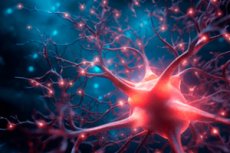New publications
New therapy induces weight loss in mice by targeting the appetite center
Last reviewed: 02.07.2025

All iLive content is medically reviewed or fact checked to ensure as much factual accuracy as possible.
We have strict sourcing guidelines and only link to reputable media sites, academic research institutions and, whenever possible, medically peer reviewed studies. Note that the numbers in parentheses ([1], [2], etc.) are clickable links to these studies.
If you feel that any of our content is inaccurate, out-of-date, or otherwise questionable, please select it and press Ctrl + Enter.

A groundbreaking paper in the journal Nature describes a promising new obesity therapy that leads to greater weight loss in mice than existing drugs. The approach involves delivering molecules to the brain's appetite center and influencing the brain's neuroplasticity.
"I think the drugs on the market today are the first generation of weight loss drugs. Now we have developed a new type of weight loss drug that affects brain plasticity and seems to be very effective."
That's according to Associate Professor and group leader Christoffer Clemmensen from the Novo Nordisk Foundation Centre for Basic Metabolic Research at the University of Copenhagen, who is senior author of the new study published in the prestigious scientific journal Nature.
In the study, Christoffer Clemmensen and colleagues demonstrate a new use for the weight-loss hormone GLP-1. GLP-1 can be used as a "Trojan horse" to deliver a specific molecule into the brains of mice, where it successfully influences brain plasticity and leads to weight loss.
"The effect of GLP-1 in combination with these molecules is very strong. In some cases, mice lose twice as much weight as mice treated with GLP-1 alone," Clemmensen says.
This means that future patients may achieve the same effect with a lower dosage. Moreover, the new drug may become an alternative for those who do not respond well to existing weight loss drugs.
"Our studies in mice show side effects similar to those experienced by patients treated with current weight-loss drugs, including nausea. But because the drug is so effective, we may be able to lower the dosage and thus reduce some of the side effects in the future - although we don't yet know how people will respond to the drug," he adds.
Testing of the new weight loss drug is still in the so-called preclinical stage, which is based on studies with cells and experimental animals. The next step is clinical trials involving people.
"We already know that GLP-1-based drugs can cause weight loss. The molecule we attached to GLP-1 affects the so-called glutamatergic neurotransmitter system, and in fact other studies in humans suggest that this family of compounds has significant potential for weight loss. What's interesting here is what effect we get when we combine these two compounds into one drug," Clemmensen emphasizes.
The drug must undergo three phases of clinical trials involving humans, which could take eight years before the drug is available on the market, Clemmensen said.
The brain protects excess body weight Clemmensen and his colleagues became interested in molecules that are used to treat chronic depression and Alzheimer's disease.
These molecules block a protein receptor called the NMDA receptor, which plays a key role in long-term changes in brain connections and has received scientific attention in the areas of learning and memory. Drugs that target these receptors strengthen and/or weaken specific neural connections.
"This family of molecules may have permanent effects on the brain. Studies have shown that even relatively infrequent treatments can lead to lasting changes in brain pathologies. We are also seeing molecular signatures of neuroplasticity in our work, but in this case in the context of weight loss," he explains.
The human body evolved to protect a certain body weight and fat mass. From an evolutionary perspective, this was probably to our advantage, as it meant we could survive periods of food shortage. Today, food shortages are not a problem in large parts of the world, where increasing numbers of people are obese.
"Today, more than one billion people worldwide have a body mass index of 30 or more. This makes it increasingly important to develop drugs that can help manage this disease and help the body maintain a lower weight. This is a topic that we devote a lot of energy to in our research," says Clemmensen.
Trojan Horse Delivers Neuroplasticity Modulators to Appetite-Regulating Neurons We know that drugs based on the gut hormone GLP-1 effectively target the part of the brain that is key to weight loss, the appetite control center.
"What's exciting about this new drug - at the cellular level - is that it combines GLP-1 and molecules that block the NMDA receptor. It uses GLP-1 as a Trojan horse to deliver these small molecules exclusively to neurons that affect appetite control. Without GLP-1, molecules that target the NMDA receptor would affect the entire brain and would thus be non-specific," says postdoc Jonas Petersen from Clemmensen's group, who is the first author of the study and the chemist who synthesized the molecules.
Non-specific drugs are often associated with serious side effects, which has been previously observed with drugs used to treat various neurobiological conditions.
"Many brain disorders are difficult to treat because drugs must cross the so-called blood-brain barrier. While large molecules such as peptides and proteins typically have difficulty accessing the brain, many small molecules have unrestricted access throughout the brain. We used GLP-1's specific access to the appetite control center in the brain to deliver one of these substances, which would otherwise be non-specific," says Clemmensen, adding:
"In this study, we focused on obesity and weight loss, but this is actually a completely new approach to delivering drugs to specific parts of the brain. So I hope that our research can pave the way for a whole new class of drugs to treat conditions like neurodegenerative diseases or psychiatric disorders."
